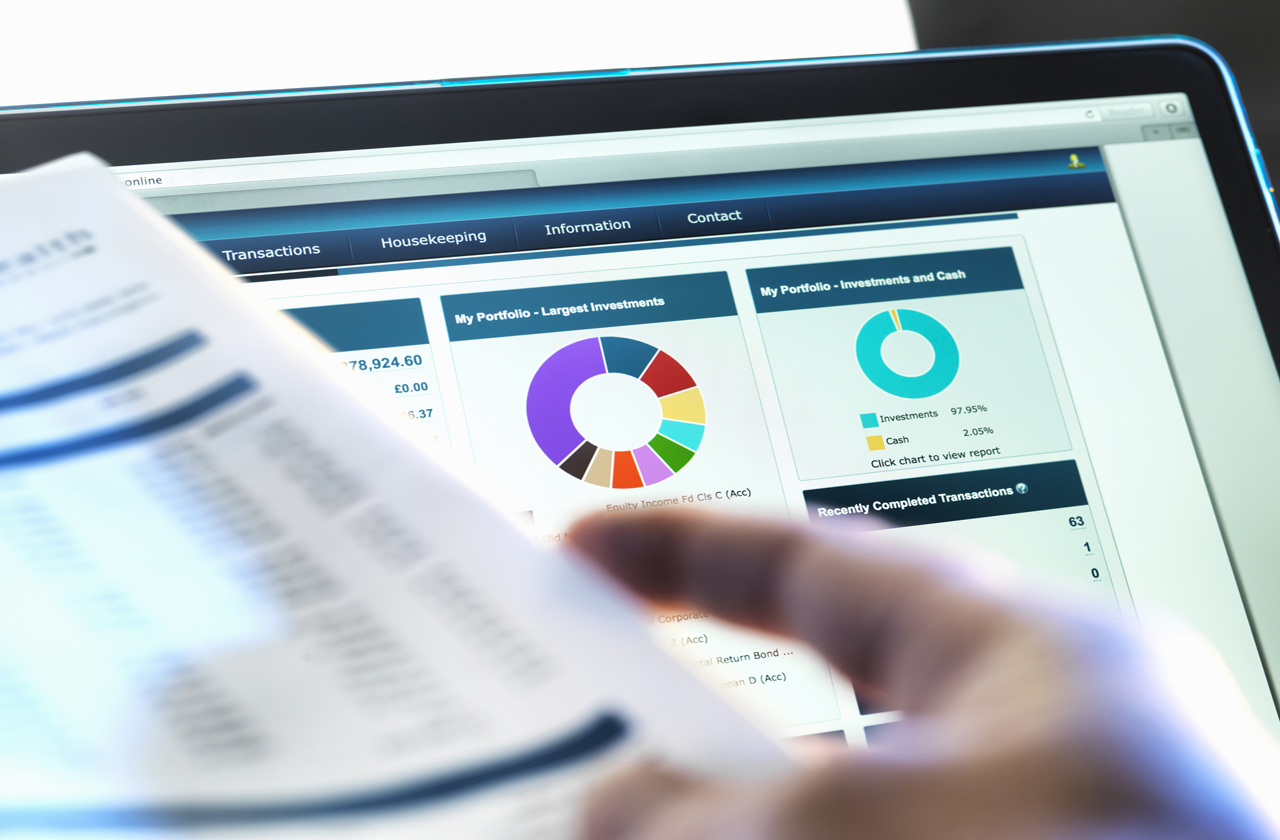Investment Moves to Consider in Times of Rising Interest Rates
The Federal Reserve has raised rates three times since December, and conservative investors have some decisions ahead. What about bonds? CDs? Dividends? Here’s what to think about.


Profit and prosper with the best of Kiplinger's advice on investing, taxes, retirement, personal finance and much more. Delivered daily. Enter your email in the box and click Sign Me Up.
You are now subscribed
Your newsletter sign-up was successful
Want to add more newsletters?

Delivered daily
Kiplinger Today
Profit and prosper with the best of Kiplinger's advice on investing, taxes, retirement, personal finance and much more delivered daily. Smart money moves start here.

Sent five days a week
Kiplinger A Step Ahead
Get practical help to make better financial decisions in your everyday life, from spending to savings on top deals.

Delivered daily
Kiplinger Closing Bell
Get today's biggest financial and investing headlines delivered to your inbox every day the U.S. stock market is open.

Sent twice a week
Kiplinger Adviser Intel
Financial pros across the country share best practices and fresh tactics to preserve and grow your wealth.

Delivered weekly
Kiplinger Tax Tips
Trim your federal and state tax bills with practical tax-planning and tax-cutting strategies.

Sent twice a week
Kiplinger Retirement Tips
Your twice-a-week guide to planning and enjoying a financially secure and richly rewarding retirement

Sent bimonthly.
Kiplinger Adviser Angle
Insights for advisers, wealth managers and other financial professionals.

Sent twice a week
Kiplinger Investing Weekly
Your twice-a-week roundup of promising stocks, funds, companies and industries you should consider, ones you should avoid, and why.

Sent weekly for six weeks
Kiplinger Invest for Retirement
Your step-by-step six-part series on how to invest for retirement, from devising a successful strategy to exactly which investments to choose.
Over the past few years — since the financial crisis of 2008 — we’ve seen interest rates compress to historic lows.
That’s been good for people with debt and those who are borrowing to buy a car or a home. But it’s problematic for careful savers and retirees looking to pull income from their investment portfolios.
A Risky Migration for Many
They paid off their mortgage, dumped their debt and put their money into safe financial vehicles, like certificates of deposit and money market accounts — only to see their nest eggs slowly crumble, thanks to inflation.
From just $107.88 $24.99 for Kiplinger Personal Finance
Become a smarter, better informed investor. Subscribe from just $107.88 $24.99, plus get up to 4 Special Issues

Sign up for Kiplinger’s Free Newsletters
Profit and prosper with the best of expert advice on investing, taxes, retirement, personal finance and more - straight to your e-mail.
Profit and prosper with the best of expert advice - straight to your e-mail.
As a result, many ended up leaving the secure savings vehicles they loved to reach for higher yields in riskier asset classes, perhaps without understanding what it could mean in the long run.
Bonds Get Bumpy
Now, as we enter what appears to be a rising-interest-rate environment (central bank policymakers have raised rates three times since December and are forecast to lift them a quarter of a percentage point once more in 2017), it could mean trouble for those who bought into funds with high-yield longer maturities.
A rise in rates can make things pretty bumpy for bond assets. We actually saw that happen rather aggressively right after the presidential election.
If that made you a bit nervous (and if it didn’t, it should have), it may be time to do a little portfolio rebalancing.
What Should Bond Investors Do?
Super-safe investors who want to stay with their bonds should look at repositioning into shorter-term (three- to five-year) bonds, which are traditionally less sensitive to rising rates than intermediate- and long-term bonds.
Floating rate notes, which typically have a two- to five-year term to maturity, also tend to behave better in a rising-interest-rate environment. FRNs have variable rates that reset periodically.
Senior Loans and Dividend Options
Another option is to pivot more into senior loans, which are loans banks make to corporations and then package and sell to investors. They’re usually secured by collateral, and if the company fails, investors are the first to be repaid — so these investments are considered less risky than high-yield bonds (although they are not risk-free).
Investors who can stomach a little more volatility may wish to move to Dividend Aristocrats, a select group of S&P 500 stocks with strong balance sheets and 25-plus years of consecutive dividend increases. These dividend growth stocks have performed well over the long term.
The Bottom Line
Now is not the time to be complacent with your income strategy.
As we enter a new era of rising rates, don’t fall victim to chasing yield and buying the biggest dividend payers. This can be an indicator of internal problems on a company’s balance sheet. The reality is, that dividend may not be around forever.
A wiser overall plan may be to invest for total return. Remember: This money is meant to last a lifetime. Yes, you want some growth to stay ahead of inflation, but you don’t want to put your retirement income at risk.
Don’t let your fears or confusion about what to do next overwhelm or paralyze you. A trusted financial professional can help you rework your strategy into something that can lower your risk tolerance while maintaining as much growth as possible.
Kim Franke-Folstad contributed to this article.
This article was written to give broad-based recommendations and ideas. Clients should discuss any proposed strategy mentioned in this newsletter with Dan & Jason to see how it aligns with your portfolio, risk & personal circumstance.
Profit and prosper with the best of Kiplinger's advice on investing, taxes, retirement, personal finance and much more. Delivered daily. Enter your email in the box and click Sign Me Up.

Dan Webster originally hails from Rochester, N.Y., and currently resides in Pawleys Island, S.C. He is a Registered Financial Consultant and is a member of the International Association of Registered Financial Consultants and the Financial Planning Association.
-
 Over 65? Here's What the New $6K 'Senior Deduction' Means for Medicare IRMAA Costs
Over 65? Here's What the New $6K 'Senior Deduction' Means for Medicare IRMAA CostsTax Breaks A new deduction for people over age 65 has some thinking about Medicare premiums and MAGI strategy.
-
 U.S. Congress to End Emergency Tax Bill Over $6,000 Senior Deduction and Tip, Overtime Tax Breaks in D.C.
U.S. Congress to End Emergency Tax Bill Over $6,000 Senior Deduction and Tip, Overtime Tax Breaks in D.C.Tax Law Here's how taxpayers can amend their already-filed income tax returns amid a potentially looming legal battle on Capitol Hill.
-
 5 Investing Rules You Can Steal From Millennials
5 Investing Rules You Can Steal From MillennialsMillennials are reshaping the investing landscape. See how the tech-savvy generation is approaching capital markets – and the strategies you can take from them.
-
 When Estate Plans Don't Include Tax Plans, All Bets Are Off: 2 Financial Advisers Explain Why
When Estate Plans Don't Include Tax Plans, All Bets Are Off: 2 Financial Advisers Explain WhyEstate plans aren't as effective as they can be if tax plans are considered separately. Here's what you stand to gain when the two strategies are aligned.
-
 Counting on Real Estate to Fund Your Retirement? Avoid These 3 Costly Mistakes
Counting on Real Estate to Fund Your Retirement? Avoid These 3 Costly MistakesThe keys to successful real estate planning for retirees: Stop thinking of property income as a reliable paycheck, start planning for tax consequences and structure your assets early to maintain flexibility.
-
 I'm a Financial Planner: These Small Money Habits Stick (and Now Is the Perfect Time to Adopt Them)
I'm a Financial Planner: These Small Money Habits Stick (and Now Is the Perfect Time to Adopt Them)February gets a bad rap for being the month when resolutions fade — in fact, it's the perfect time to reset and focus on small changes that actually pay off.
-
 Social Security Break-Even Math Is Helpful, But Don't Let It Dictate When You'll File
Social Security Break-Even Math Is Helpful, But Don't Let It Dictate When You'll FileYour Social Security break-even age tells you how long you'd need to live for delaying to pay off, but shouldn't be the sole basis for deciding when to claim.
-
 I'm an Opportunity Zone Pro: This Is How to Deliver Roth-Like Tax-Free Growth (Without Contribution Limits)
I'm an Opportunity Zone Pro: This Is How to Deliver Roth-Like Tax-Free Growth (Without Contribution Limits)Investors who combine Roth IRAs, the gold standard of tax-free savings, with qualified opportunity funds could enjoy decades of tax-free growth.
-
 One of the Most Powerful Wealth-Building Moves a Woman Can Make: A Midcareer Pivot
One of the Most Powerful Wealth-Building Moves a Woman Can Make: A Midcareer PivotIf it feels like you can't sustain what you're doing for the next 20 years, it's time for an honest look at what's draining you and what energizes you.
-
 I'm a Wealth Adviser Obsessed With Mahjong: Here Are 8 Ways It Can Teach Us How to Manage Our Money
I'm a Wealth Adviser Obsessed With Mahjong: Here Are 8 Ways It Can Teach Us How to Manage Our MoneyThis increasingly popular Chinese game can teach us not only how to help manage our money but also how important it is to connect with other people.
-
 Looking for a Financial Book That Won't Put Your Young Adult to Sleep? This One Makes 'Cents'
Looking for a Financial Book That Won't Put Your Young Adult to Sleep? This One Makes 'Cents'"Wealth Your Way" by Cosmo DeStefano offers a highly accessible guide for young adults and their parents on building wealth through simple, consistent habits.